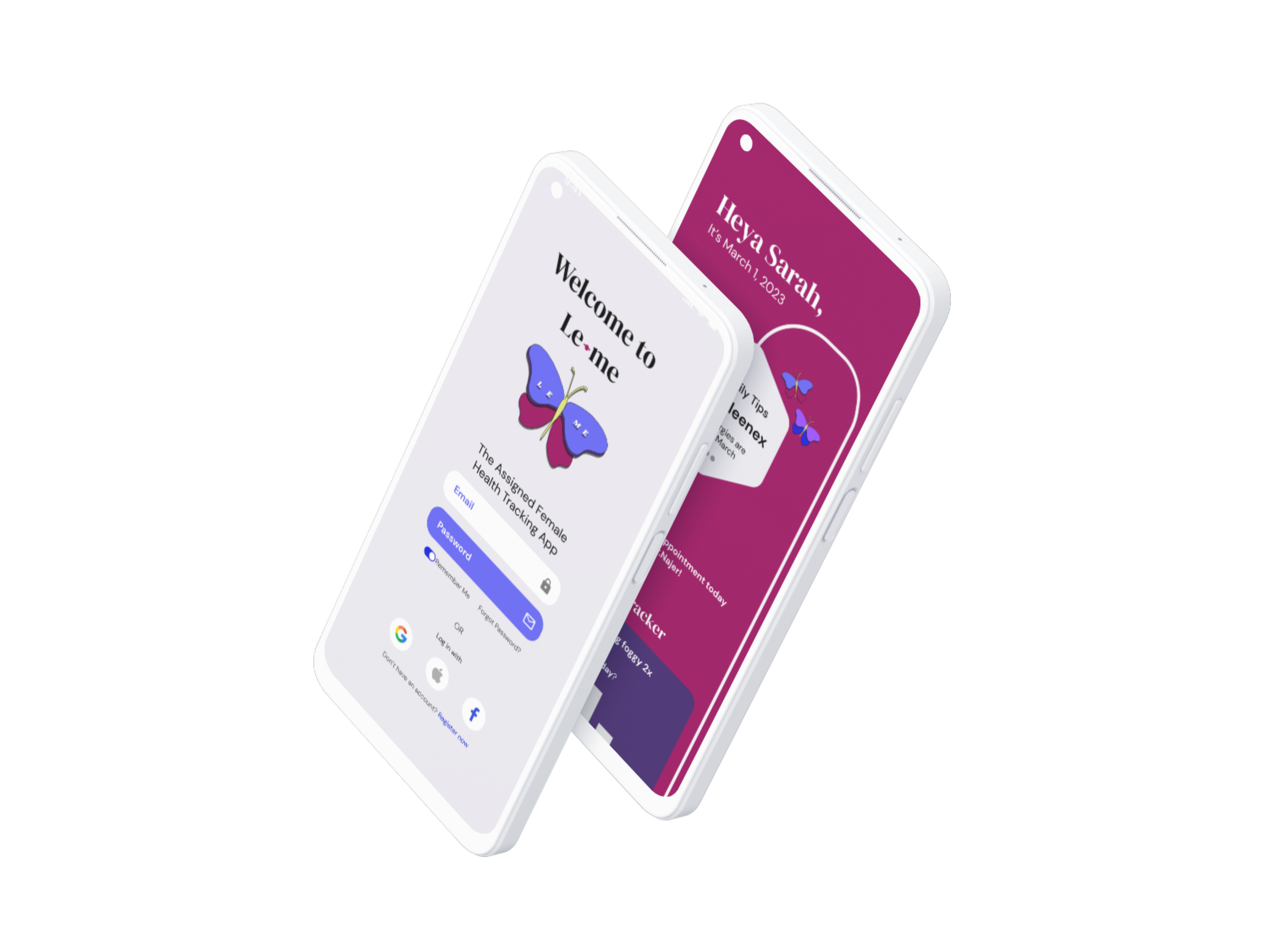
Le-Me Health App
Health tracking app for women and people DFAB to help isolate symptoms from reproductive cycle and other systems to catch diagnoses earlier.
It started with a conversation
Starting as a school project with Brainstation, I’m continuously developing the application as I believe in the mission of LeMe App.
Year
Feb 2023 - Present
Roles
UX Research
UI Design
Client
School Project -> Private Project
Historical Gender Bias
Prior to 1994, women were excluded from medical studies. Today, women are suffering from misdiagnosis and unsuitable medical interventions because of this.
THE CHALLENGE
Misdiagnose Frequency
On average, women and people designated female at birth are diagnosed
4 Years later when it comes to 700+ Diseases and
2.5 Years Later when it comes to cancer.
QUOTE
Ineffective Treatments
In 2005, 8/10 prescription drugs were withdrawn from the US market because of women's health issues.
“For women aged 30 to 55, most cases of heart disease will be chalked up to pregnancy, peri-menopause or menopause. Lack of knowledge that heart disease is absolutely different for women than it is for men. And we can't continue to compare them." - Colleen Norris - Nursing Professor
THE SOLUTION
Let’s take control of our health and start tracking our symptoms so we can remove bias, identify symptom trends, and advocate for our health earlier.
Create a symptom tracker so individuals can:
Track their period, and other symptoms
Identify trends and symptoms belonging to reproductive cycle
Isolate symptoms that may be indicated illness or disease
Build and download health trend reports
Advocate for appropriate medical intervention by showing reports
Gaining understanding
Starting with the Hypothesis:
I believe that adult women are getting misdiagnosed because of a lack of understanding of female health symptoms and biased communication from healthcare providers. I will know my hypothesis is correct when I see 2 out of 3 of my interview participants confirm they have received misdiagnoses.
Acknowledging Assumptions:
1. Communication barriers - women and people DFAB don’t feel taken seriously when expressing health concerns.
2. Busy lifestyle - difficulty tracking symptoms frequency and relevancy and depend on doctors for accurate diagnoses.
3. Period bias - high misdiagnose frequency as symptoms are overly associated with “normal” menstruation.
Research Participant Requirements:
1. Women & people designated female at birth (DFAB)
2. Ages 13 - 50 (the menstruating age range)
3. Misdiagnosed previously
4. Live in Canada
Health Advocacy
Communication
Health Tracking
Biased Treatment
Pain Points
Feeling forgotten by the system
Being disregarded
when asking for help
Making sense of
related symptoms
No in depth diagnosis,
assumptions to menstrual health
THE INTERVIEWS
Affinity Mapping
Motivations
Staying on top of
personal health coniditions
Being heard
and acknowledged
Insightful Health
Trends and Progress
Identifying root cause
of health issues and relief
Behaviour
Leading appointments,
using key phrases to get attention
Consulting other sources
Clinics, friends, internet
Mentally tracking
symptoms
Self-diagnosing or trial testing
a series of generalized treatments
Goals
Determining Diagnosis
Accurately
Invoking more doctor care
and investigation
Preventing missed
diagnoses
Identified health issue
and tailored holistic treatment
Opportunities
Providing format to express
issues within appointment time frame
Collaborative healthcare,
teaching users language and structure
Support tracking symptoms over time
and tying the relevant symptoms
Support tracking symptoms over time
and tying the relevant symptoms
The Interviews
The Results
Quotes
“I’ve been getting horrible stomach pain, my doctor keeps prescribing birth control” - Maya
”My cycle’s been excruciating lately, my doc says its normal and I just have to deal with it” - Kaylie
”My acne is cystic and everywhere, it makes me so insecure, apparently if I go on the pill it’ll stop” - Selma
”Having a female reproductive system is not the source for all DFAB health problems. The pill is not a one stop solution” - Elena
”I don’t wan’t to go on the pill, I’ve been there before and it made things worse. Can I just get some other medical advice?” - Ayesha


